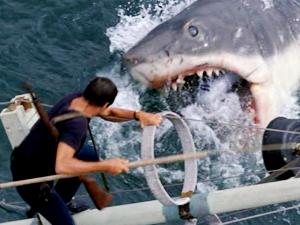Jaws (1975)
[10]
Steven Spielberg’s adaptation of Peter Benchley’s shark thriller is extraordinarily well made and far more sophisticated than your average monster movie. The first half is a solid scare-fest that unwinds beautifully, from the first vicious attack on a late night bathing beauty to the sensational tragedy during the town’s Fourth of July festivities. Once the people of Amnity Island have had enough the movie shifts gears, focusing squarely on three determined men and their attempt to destroy the leviathan.
In Jaws, the thrills and spills are only half the fun. The other half is the dynamic among the three leading men — Roy Scheider, Richard Dreyfuss, and Robert Shaw. The highlight of the movie is seeing the three bond over battle scars. The scene ends with an amazing soliloquy from Shaw, as his character recounts the story of the U.S.S. Indianapolis — the true story of a ship that sank in 1945, leaving hundreds of men to die in shark-infested waters. One of the film’s greatest strengths is that this old-fashioned campfire storytelling moment holds its own against all of the film’s more visceral shark attacks. When your grace notes are as compelling as your action set pieces, then you’re firing on all cylinders.
Jaws has it all — atmosphere and adrenaline, scares and heart — aided immeasurably by the work of editor Verna Fields and composer John Williams, both of whom won Oscars for their contributions.
Academy Awards: Best Film Editing (Verna Fields), Best Music Score (John Williams), Best Sound
Oscar Nominations: Best Picture



